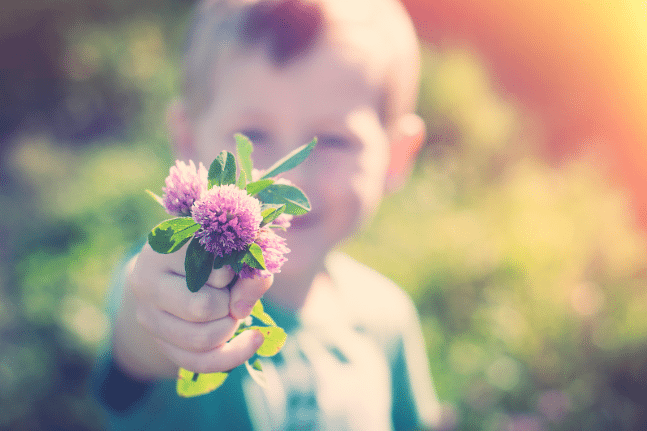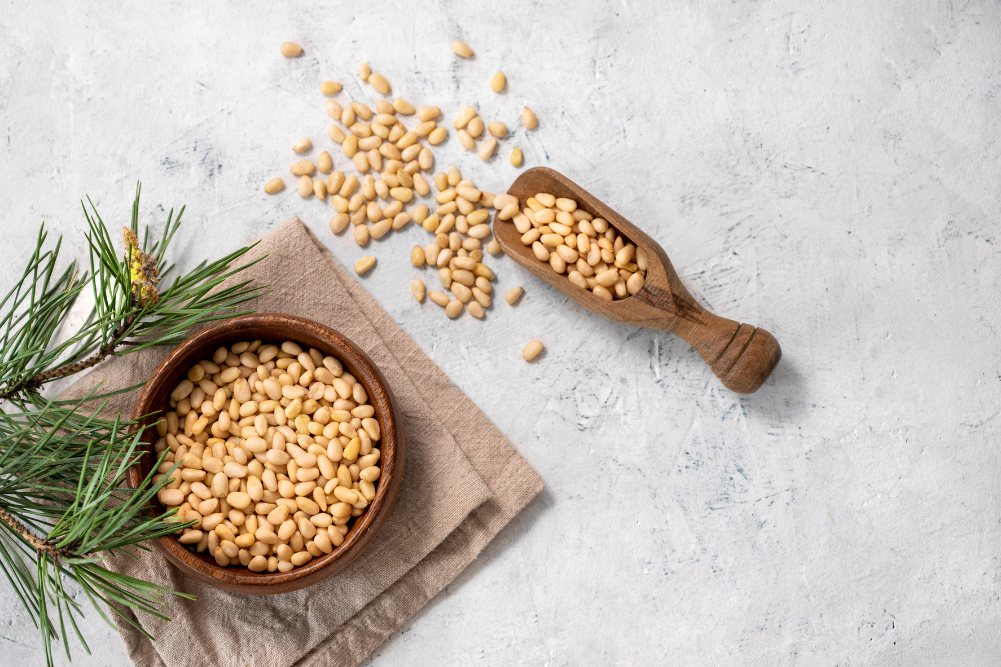How to nurture a child’s intuition
When my four-year-old said, “I can see colours, Mummy” I wasn’t expecting it. While my eldest daughter had always been quite sensitive as a baby, I was shocked the day she started to talk to me about the colours and auras she saw around people. Despite being raised by a “hippie” mum myself — yoga, positive affirmations and energy healing were part of my childhood — when my daughter first started mentioning the “colours” she saw, I wasn’t really sure what to do.
The truth is, having an intuitive child can be quite confronting, even for the most open parent. It brings up questions of not only your own belief systems but also of your own childhood and what you were taught about intuition and spirituality. Once I started researching how to speak to and guide my intuitive child, I began to understand that my daughter’s journey is just as much about my own reaction as hers. I also quickly discovered that while my other children didn’t speak of colours, they are, in their own way, very intuitive as well — and it was my job to nurture and guide the unique skills of each of them.
An intuitive generation?
Children are born with a natural intuitive sense of their world. Julie Hamilton, author of Generation Intuitive, says, “All of our children are born with the gift of intuition — a knowing that goes beyond reason and directly plugs them into their deepest wisdom and connects them with who they really are. What we have to do, as parents and carers, is to understand how intuition works and foster our kids’ innate relationship with it.”
Once I started researching how to speak to and guide my intuitive child, I began to understand that my daughter’s journey is just as much about my own reaction as hers.
While some children are clear communicators of their sixth sense, it’s wrong to assume they are the only ones with intuitive senses. “All children are intuitive, but some are highly intuitive and experience more intuitive messages, or perceptions, with greater frequency than other children,” says Catherine Crawford, a family therapist specialising in empath adults and children, and author of The Highly Intuitive Child: A Guide to Understanding and Parenting Unusually Sensitive and Empathic Children. She explains that, in other cultures around the world, the intuitive nature of children is much more readily accepted.
“In the research phase of my book, I had the privilege of speaking with some gifted and powerful indigenous elders from around the world and the opportunity to ask them similar questions,” says Crawford. “What I learned is that many indigenous peoples are much better than us in our modern culture at being able to detect these gifts in children and support them. Intuitive gifts are not new but we are now poised to see them with less fear and more support in our culture today. I am not sure if the current generation is more intuitive than before. Perhaps. I do think parents are much more accepting in this current generation of parenting and that is exciting.”
Megan Koufos is a healer and coach working with intuitive children and their families. She agrees that, while all children are intuitive to a degree, there does seem to be something different about the current generation. “I do believe that we as a human race are evolving and the new kids that are coming through with these heightened gifts are the new wave of that evolution. Their gifts are heightened, more developed and they are more sensitive to the energies around us. As the energetic vibration of the Earth increases, it paves the way for these beautiful high-vibrational souls to come through.”
Your role as a parent
So what is the role of parents of these children? How do you nourish and support your children’s insights?
“As your child’s first teacher, guide and mentor, you are their most important and trusted person in the area of exploring and experimenting with their gifts. Having some knowledge and understanding of energy, energetic cleansing and clearing, protection, basic crystals, the different chakras, angels and guides, and any other areas that you feel drawn to, is the most important thing you can do,” says Megan Koufos.
If we nurture a child’s early years, however, we can ensure their connection to their inner voice and knowledge is intact for later in life.
“If there is anything you feel uncomfortable or fearful about, be mindful of this, as your child will pick up on your energy and start to create their own fears. And they will start to lose their intuition.”
On the other hand, if a parent can encourage a child’s sixth sense, they are able to help them strengthen their special gifts.
“Intuitive intelligence gives our children the ability to make fantastic choices for themselves at every crossroad and keeps them connected to their authentic selves so they can enjoy deeply rich and fulfilling lives,” agrees Crawford. “Until now, this dimension of our children’s development has largely slipped under the radar because, though most of us want this for our children, we don’t have a clear idea of how to nurture it; not least because we weren’t taught how to do this ourselves and many of us have spent much of our lives trying to work it out.”
It’s important to not label your child, though. Parents are often very keen to latch onto titles and labels for their children’s special gifts — something very common to our culture and generation. While terms like “indigo children” are often used and can help a parent feel more comfortable with their sensitive and intuitive child’s gifts, Koufos is adamant we should be very careful of stereotypes.
“All of the beautiful children that come through are a mix of a lot of different characteristics — and some parents like a label to rely on,” she says. “But these labels can create separation, which goes against everything these children are here to do.”
How to identify your child’s intuition
“The children that are coming through right now have different ways of expressing themselves and their intuition,” Koufos says. “Some are drawn and connected to nature, express themselves through dance or have vivid dreams. Some kids will have a strong connection to crystals and seem to already know what power they have, while some see and talk about spirits. And others just have a sixth sense about things. It’s our job as parents to be open to the beautiful messages and gifts our children are bringing through.”
Koufos suggests that some of the characteristics that your spiritually gifted child might have are:
- They know how you are feeling or what you are thinking without telling them — they know what to do and say without you having to tell them.
- They need alone time after crowded places like school or shopping centres.
- They are sensitive to artificial preservatives, additives and chemicals.
- They will tell you they can see things — like flashes of colour, sparkles, orbs or spirits.
- They will tell you they can hear things, like constant ringing in their ears, music.
- They will just know things without being able to explain how.
- They can be prone to sudden mood changes without being able to explain it.
- They can feel out of place here on Earth — like they don’t belong.
The importance of nurturing their gifts
For many of us, nurturing our intuition was not part of our upbringing. Dreams were dismissed; worries about things you couldn’t clearly explain were written off as childish behaviour. And, because of that, your intuition and trust in your own inner voice has been repressed. That’s why if you now see these qualities in your own children, you need to be mindful of your reaction.
“When a baby is born,” says Koufos, “their intuitive and psychic senses are off the charts, and their auras are as big as a room. So if these beautiful gifts are not encouraged and nurtured in our children, then eventually, like a muscle that is not worked, they become weak and disappear.
“Around the age of seven, a child’s subconscious closes off and everything they have been absorbing for the past seven years forms the basis of their belief system. Interestingly, it’s also around this time that a child’s fontanelle in their skull tightly fuses together. This is also the time when they start to disconnect from source and begin to assert their independence more freely.”
Once you feel a little more comfortable about your child’s intuitive gifts, you can start experimenting with them to see what helps them feel safe and comfortable.
If we nurture a child’s early years, however, we can ensure their connection to their inner voice and knowledge is intact for later in life.
Crawford works with a number of highly intuitive children and adults in her psychotherapy practice in the UK. “I can tell you that the support an intuitive child receives growing up makes a significant difference in how an adult intuitive integrates this ability successfully into daily life. Intuitive children who are raised with respect for their insights and are taught to manage the stressors that can emerge with this trait grow up to be healthy, balanced, intuitive adults.
“On the other hand, highly intuitive children who learn to regularly suppress their intuition suffer consequences of reduced self-esteem, self-doubt, decision-making confusion and difficulties with interpersonal boundaries as adults,” Crawford suggests. “The reason for these problems is largely because, if and when a child stops listening to and trusting her intuition, then she is suppressing the connection to her vitality and inner truth. When a child stops respecting her own inner compass, she is more likely to defer to what other people want of her — even at the expense of her own health, boundaries and better judgement.”
Guiding your intuitive child
Once you feel a little more comfortable about your child’s intuitive gifts, you can start experimenting with them to see what helps them feel safe and comfortable, and what really connects with them. Here are some ideas:
- Take your child to a crystal shop and let them run their hands over the crystals and choose what they need. Just give them the time to run their hands over them.
- Let them play with oracle cards.
- Play the “Intuition Game”: hide things around the house, get them to close their eyes and see if anything or any words pop into their mind. Or, when the phone rings, ask “I wonder who that is?”
- Maintain a positive attitude when children voice their intuitions. Kids who are very specific with their intuitive insights — such as specific predictions that soon come true — can surprise or frighten parents and trigger strong emotional responses, ranging from awe at one end of the spectrum to shock at the other. Intuitive kids are quite perceptive and, if they notice that their intuitions are upsetting to parents, or that they receive unusual praise for insights that seem perfectly natural to them, they may either silence their intuitive perceptions or use them to get attention in order to feel special.
- Pay attention to your child’s health. If your highly intuitive child is acting out with angry outbursts, is vulnerable to dramatic mood swings or is suffering from unexplained aches and pains, he may be reacting to the constant inflow of feelings and information from the outside world. These children need to learn how to manage stress, recognise others’ emotions without taking them on and protect their health. By understanding that your child’s symptoms are real and related to outside stressors, you can help him find healthy ways to express feelings.
- Teach them how to protect themselves. Megan Koufos suggests energetic shielding and energetic cleansing, especially if the child takes on lots of different energies. Teach them to surround themselves in a bubble of light (pink for love, green for healing) or put on their superhero cap. A salt and bicarb soda bath at night to cleanse their energy is also really beneficial.
The most important thing is to give your child the room to express, play and experience their gifts, and to release any expectations or control around how you want or believe it “should” show up. Your child has a gift and the more you can make them feel comfortable about this unique ability, the more it will develop and help them become an empathetic — and quite powerful — adult..








